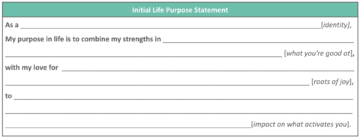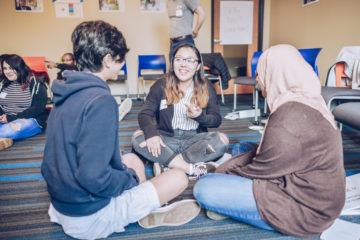Through identity exploration, social-emotional learning, and community building, nXu catalyzes students and educators to develop their purpose, invest in their future, and live thriving lives. According to nXu, purpose is a fundamental human motive at the root of major markers of success throughout one’s life. Youth with a strong sense of purpose experience greater life satisfaction and physical, mental, and emotional well-being; perform better in school; and have higher rates of college retention. Adults with a strong sense of purpose also experience greater life satisfaction, financial and professional success, resiliency, and longevity.
nXu’s CASEL-aligned Purpose & SEL model—specifically, its Nexus Curriculum—is currently being implemented in a growing number of middle and high schools across the country, where students experience significant growth in their sense of purpose and associated social-emotional constructs. nXu offers cohort learning opportunities, professional development, direct model implementation, and more to schools interested in implementing its model.
What Makes this Model Innovative?
Whole-Child Focus
Relevance
Affirmation of Self & Others
Goals
The Purpose & SEL model has integrated key developmental constructs so that students (and educators) can develop their purpose, invest in their future, and live thriving lives.
Purpose & SEL Competencies
Improved social-emotional competencies and an increase in sense of purpose as measured by growth in self-awareness, resilience, and overall sense of purpose.
Positive Identity Development
Increase in positive sense of identity as measured by growth in personal identity, self-efficacy, and clarity of future goals, especially goals related to career aspirations.
Positive Social Behavior
Increase in positive social behavior as measured by growth in social awareness, interpersonal skills, and social capital development.
Belonging and Connection
Increase in belonging and connection as measured by growth in general sense of belonging, and school connectedness and engagement.
Experience
 nXu’s CASEL-aligned model and curriculum—which places purpose development at the nexus of SEL skill development and career exploration along with identity development and social capital development—engages students (and educators) in defining personal and professional pathways that align with their evolving sense of self. Each lesson strategically integrates these five often-disparate constructs so that students—and adults—can live lives aligned with their highest potential.
nXu’s CASEL-aligned model and curriculum—which places purpose development at the nexus of SEL skill development and career exploration along with identity development and social capital development—engages students (and educators) in defining personal and professional pathways that align with their evolving sense of self. Each lesson strategically integrates these five often-disparate constructs so that students—and adults—can live lives aligned with their highest potential.
Students engage in various activities to discover their purpose and pursue a purpose-driven life. They begin by first developing an understanding of what purpose is, which nXu defines as the guiding intention at the intersection of their strengths, interests, and what the world needs. Students also explore the positive outcomes associated with a strong sense of purpose, like engagement in school and more satisfying relationships. Understanding these benefits supports students in internalizing the importance of purpose and committing to the work. Students set goals around their purpose work and reflect on where they are on their individual journey.

Example Activity: To begin to uncover their purpose, students engage in peer interviews and then search for common themes across those interviews. They then use their findings to write an initial draft of their purpose statement, using a template.
 In order to discover their purpose, students must uncover their identity. Students learn about and reflect on different aspects of their identity to emerge with a strong sense of self. Students reflect on memorable life experiences and how they impacted who they are today. They also learn about the intersections of identity and engage in discussions around how their intersecting identity shapes their experiences in the world. With each exploration, students learn to own and celebrate their identity.
In order to discover their purpose, students must uncover their identity. Students learn about and reflect on different aspects of their identity to emerge with a strong sense of self. Students reflect on memorable life experiences and how they impacted who they are today. They also learn about the intersections of identity and engage in discussions around how their intersecting identity shapes their experiences in the world. With each exploration, students learn to own and celebrate their identity.
Example Activity: Students begin to uncover their identity by crafting their life story. They learn the power of storytelling in sharing one’s identity and how narratives also shape how they see themselves and their future. Students complete a life timeline with memorable moments and their impact to craft their story. They then share (parts) of their life story with their peers; by so doing, they practice supportive listening, vulnerability, and empathy. Sample Lesson
 Opportunities for social-emotional development are integrated throughout the model. Every nXu lesson ends with Celebrate—an activity defined by gratitude and affirmation that builds an asset-based mindset. Students also often work together with a partner or in groups, giving them opportunities to build critical skills like collaboration. nXu also explicitly teaches social-emotional competencies like self-awareness (see example below). Additionally, students learn practices to support their well-being, like mindfulness and meditation, which helps them understand that self-care is critical in order to live one’s purpose and change the world.
Opportunities for social-emotional development are integrated throughout the model. Every nXu lesson ends with Celebrate—an activity defined by gratitude and affirmation that builds an asset-based mindset. Students also often work together with a partner or in groups, giving them opportunities to build critical skills like collaboration. nXu also explicitly teaches social-emotional competencies like self-awareness (see example below). Additionally, students learn practices to support their well-being, like mindfulness and meditation, which helps them understand that self-care is critical in order to live one’s purpose and change the world.
Example Activity: Students build self-awareness by learning to identify their emotions and recognizing how different experiences shape their feelings and behaviors. Students learn to break down their emotions by identifying the physiological responses to certain experiences and learning to self-regulate.
Students explore different careers to build awareness of the postsecondary landscape. Students engage in in-depth research to learn about fields and professions that interest them. Students also leverage visualization as a way to gain clarity about what their future in a particular field will look like. They practice setting goals around future careers and taking action toward short- and long-term goals.
Example Activity: Students begin to map out a vision for the different stages of their life, understanding that having a vision and purpose can help anchor them to navigate whatever uncertainty comes their way. Students create a Seasons of Life Map and prioritize where they will focus their energies at different periods of their life. They also create a Future Timeline that reflects key milestones they aim to achieve to live out their vision in the next two seasons of their life, creating specific actions for the next month to 10 years.
 Opportunities for relationship building and social capital development are embedded throughout the model. To build relationships, every nXu lesson begins with Connect—a ritual where students respond to a series of prompts that allow students to form and sustain relationships and practice vulnerability. nXu also has lessons that aim to explore what social capital is and support students in both recognizing the network they have and building the skills and knowledge needed to continue to expand their network.
Opportunities for relationship building and social capital development are embedded throughout the model. To build relationships, every nXu lesson begins with Connect—a ritual where students respond to a series of prompts that allow students to form and sustain relationships and practice vulnerability. nXu also has lessons that aim to explore what social capital is and support students in both recognizing the network they have and building the skills and knowledge needed to continue to expand their network.
Example Activity: Through a network mapping project focused on social capital development, students take stock of their personal and professional connections and organize them into relationship groups using categories like family/family acquaintances, peers/near peers, employment/service/internships, and more. Students create a networking map by placing themselves in the center of the map and then drawing lines of connection to community members, taking note of those with whom they have strong ties. They then examine their network through different lenses like size, structure, diversity, and strength, to help them understand that while there is no “right” community, the best network is the one that will support them in meeting their life goals and adds value to their community.
Supporting Structures
The model can be integrated into a school’s existing overall model but will require shifts in adult roles and development as well as scheduling to include the Purpose & SEL curriculum, instruction, and assessment.
Implementing the model entails using its robust curriculum, which has been shown to support the development of a sense of purpose, identity, and social-emotional growth as well as social capital and career knowledge.
nXu’s model is anchored around its Nexus Curriculum—a research-based, purpose development, SEL skill development & career exploration curriculum that prepares students for the 21st-century world of work while also developing a sense of purpose in the lives of youth and adults—from ways to foster key mindsets to identifying purpose-specific “teacher moves.”
nXu’s modularized middle and high school curriculum consists of two modules per grade level; each module consists of about 10 lessons. The modularized curriculum allows schools to leverage it in a way that best works for their context. Schools can use the curriculum in different settings (e.g., advisory, career & college readiness) and frequencies or even strategically teach select modules that best fit their needs. Each lesson includes a facilitator manual with scripted framing for key parts and transitions to minimize the cognitive load on teachers while also leaving flexibility for teachers to tailor the lesson to their own language. The curriculum also includes student-facing materials, a slide deck that can be used for both in-person or virtual delivery, and a system to track progress along the way. Sample Lesson
nXu’s lessons are structured and organized into the following three core components:
- Connect – A ritual at the beginning of each class period, when students have space to individually respond to a series of prompts. This practice helps students draw on previous learning, form and sustain relationships, be present with their social-emotional well-being, and practice vulnerability.
- Cultivate – The bulk of each lesson is dedicated to the Cultivate experiences, which engage students in the practices that build toward a greater sense of purpose and develop their SEL competencies. Students are asked to first reflect on and provide an initial reaction or response to the major learning objective for the day. Students then engage in a collaborative, discussion-based activity that is centered around an analysis of a common text, video, or concept. After analyzing and sharing their ideas, students will reflect on how the knowledge they acquired from the day will help them to build upon or inform their purpose journey.
- Celebrate – All Celebrate activities are defined by gratitude and affirmation and take place at the close of each lesson. These activities build and reinforce an asset-based mindset—a mindset defined by strengths.
Adults must foster their own sense of purpose so they can help students develop theirs.
All educators know that a curriculum on its own cannot move the needle. Through pilots with thousands of students and hundreds of adults, nXu has generated deep and valuable insights for a successful implementation, from fostering key mindsets to identifying purpose-specific “teacher moves.”
nXu trains educators to implement the model with students, and they also offer their purpose development programming for adults to experience themselves. In nXu’s interactive training, educators explore, experience, and learn strategies to foster their own sense of purpose and to help students develop theirs. nXu’s educator programming is designed to generate an increase in sense of purpose, personal identity, belonging, and life/job satisfaction. nXu believes that no person finds purpose in a bubble but rather through interacting with the needs, ideas, and inspirations of their communities. As a result, educators are encouraged to reflect upon, build, and hone a sense of community within the shared experiences of other nXu educators and within their professional and personal communities.
In these professional development experiences, attendees:
- Learn about research and rationale behind purpose development;
- Learn about and internalize nXu’s methodology and four-part lesson plan framework;
- Receive the training necessary to implement nXu’s Purpose & SEL curriculum;
- Learn about the relevance and importance of purpose development for both youth and adults;
- Learn firsthand how to articulate their own sense of purpose and how to help students do the same;
- Learn how to incorporate nXu’s evidence-based, purpose development methodology and curriculum into their school and classroom;
- Learn best-practice strategies for building and establishing the culture and community necessary for purpose learning;
- Receive concrete instructional tools and resources;
- Plan and practice facilitating purpose learning lessons and activities and receive real-time coaching and feedback;
- Connect with other educators interested in exposing students to purpose development.
Educators may also receive ongoing professional development and coaching as well as targeted strategic support with data analysis from nXu.
nXu’s curriculum is modularized and can be adjusted to fit within many schedules.
nXu’s modularized middle and high school curriculum consists of 2 modules per grade level; each module consists of about 10 lessons. Each lesson is about 50–60 minutes long but is designed to be adaptable and can be shortened or lengthened as needed. The curriculum can be deployed in various ways including over one school year, over one semester, or over 4 years (a quarter of the curriculum per year). In addition to the different settings and scheduling options the modularized curriculum allows, schools can even strategically teach select modules that best fit their needs. Use Cases
nXu’s outcome aligned measurement system can support continuous improvement in programming when schools choose to use it.
nXu has developed a codified and validated measurement system that is shared with educators for their use. Schools that adopt the nXu model can implement nXu’s outcomes and measurement system to evaluate the effectiveness of their implementation of the model. To measure and track progress, they administer a comprehensive pre- and post-survey.
Implementing the model entails using its robust curriculum, which has been shown to support the development of a sense of purpose, identity, and social-emotional growth as well as social capital and career knowledge.
nXu’s model is anchored around its Nexus Curriculum—a research-based, purpose development, SEL skill development & career exploration curriculum that prepares students for the 21st-century world of work while also developing a sense of purpose in the lives of youth and adults—from ways to foster key mindsets to identifying purpose-specific “teacher moves.”
nXu’s modularized middle and high school curriculum consists of two modules per grade level; each module consists of about 10 lessons. The modularized curriculum allows schools to leverage it in a way that best works for their context. Schools can use the curriculum in different settings (e.g., advisory, career & college readiness) and frequencies or even strategically teach select modules that best fit their needs. Each lesson includes a facilitator manual with scripted framing for key parts and transitions to minimize the cognitive load on teachers while also leaving flexibility for teachers to tailor the lesson to their own language. The curriculum also includes student-facing materials, a slide deck that can be used for both in-person or virtual delivery, and a system to track progress along the way. Sample Lesson
nXu’s lessons are structured and organized into the following three core components:
- Connect – A ritual at the beginning of each class period, when students have space to individually respond to a series of prompts. This practice helps students draw on previous learning, form and sustain relationships, be present with their social-emotional well-being, and practice vulnerability.
- Cultivate – The bulk of each lesson is dedicated to the Cultivate experiences, which engage students in the practices that build toward a greater sense of purpose and develop their SEL competencies. Students are asked to first reflect on and provide an initial reaction or response to the major learning objective for the day. Students then engage in a collaborative, discussion-based activity that is centered around an analysis of a common text, video, or concept. After analyzing and sharing their ideas, students will reflect on how the knowledge they acquired from the day will help them to build upon or inform their purpose journey.
- Celebrate – All Celebrate activities are defined by gratitude and affirmation and take place at the close of each lesson. These activities build and reinforce an asset-based mindset—a mindset defined by strengths.
Adults must foster their own sense of purpose so they can help students develop theirs.
All educators know that a curriculum on its own cannot move the needle. Through pilots with thousands of students and hundreds of adults, nXu has generated deep and valuable insights for a successful implementation, from fostering key mindsets to identifying purpose-specific “teacher moves.”
nXu trains educators to implement the model with students, and they also offer their purpose development programming for adults to experience themselves. In nXu’s interactive training, educators explore, experience, and learn strategies to foster their own sense of purpose and to help students develop theirs. nXu’s educator programming is designed to generate an increase in sense of purpose, personal identity, belonging, and life/job satisfaction. nXu believes that no person finds purpose in a bubble but rather through interacting with the needs, ideas, and inspirations of their communities. As a result, educators are encouraged to reflect upon, build, and hone a sense of community within the shared experiences of other nXu educators and within their professional and personal communities.
In these professional development experiences, attendees:
- Learn about research and rationale behind purpose development;
- Learn about and internalize nXu’s methodology and four-part lesson plan framework;
- Receive the training necessary to implement nXu’s Purpose & SEL curriculum;
- Learn about the relevance and importance of purpose development for both youth and adults;
- Learn firsthand how to articulate their own sense of purpose and how to help students do the same;
- Learn how to incorporate nXu’s evidence-based, purpose development methodology and curriculum into their school and classroom;
- Learn best-practice strategies for building and establishing the culture and community necessary for purpose learning;
- Receive concrete instructional tools and resources;
- Plan and practice facilitating purpose learning lessons and activities and receive real-time coaching and feedback;
- Connect with other educators interested in exposing students to purpose development.
Educators may also receive ongoing professional development and coaching as well as targeted strategic support with data analysis from nXu.
nXu’s curriculum is modularized and can be adjusted to fit within many schedules.
nXu’s modularized middle and high school curriculum consists of 2 modules per grade level; each module consists of about 10 lessons. Each lesson is about 50–60 minutes long but is designed to be adaptable and can be shortened or lengthened as needed. The curriculum can be deployed in various ways including over one school year, over one semester, or over 4 years (a quarter of the curriculum per year). In addition to the different settings and scheduling options the modularized curriculum allows, schools can even strategically teach select modules that best fit their needs. Use Cases
nXu’s outcome aligned measurement system can support continuous improvement in programming when schools choose to use it.
nXu has developed a codified and validated measurement system that is shared with educators for their use. Schools that adopt the nXu model can implement nXu’s outcomes and measurement system to evaluate the effectiveness of their implementation of the model. To measure and track progress, they administer a comprehensive pre- and post-survey.
Supports Offered
nXu offers the following resources and supports to help you implement the model.
Purpose, SEL, & Career Exploration Curriculum
Cost Associated, Funding Available
nXu’s comprehensive, CASEL-aligned curriculum equips students to navigate their world by cultivating a sense of belonging, strengthening personal and professional identities, fostering empathy and collaboration, building and mobilizing social capital, amplifying resilience, expanding career goals, and engaging in purpose-driven action. The curriculum consists of detailed, lesson-specific facilitator manuals and student resources. nXu has also developed a corresponding validated measurement and assessment tool that can help educators evaluate the impact of the curriculum.
Training & Curriculum Implementation Support
Cost Associated, Funding Available
nXu offers comprehensive educator training as well as curriculum implementation support to middle and high schools eager to incorporate an inclusive, culturally affirming purpose and SEL development curriculum with their students.
Assessment Implementation Support
Cost Associated
nXu supports schools implementing nXu’s curriculum to deploy its aforementioned assessment system, which is intentionally aligned to the curriculum. nXu offers survey deployment and data management support and also creates data dashboards for schools so they can assess the efficacy of their curriculum implementation.
Reach
Impact
Students who experience nXu’s curriculum consistently show measurable growth related to their sense of purpose and other key dimensions.
- In an Institutional Review Board–approved study of a curriculum implementation at a school, nXu’s curriculum generated statistically significant impact on students’ social-emotional development, particularly in two key dimensions: emotional wellness and positive social behavior (IRB Study, 2022).
- In one comparison group study, students across three cities who experienced nXu’s curriculum over the 2019–2020 school year reported a 10x increase in their sense of purpose compared with the comparison group (nXu Post Programming Survey, 2020).
- In a separate comparison group study, students in an East Coast school who experienced nXu’s in-school curriculum over half a school year (and during COVID and fully remote instruction) reported a 5x increase in their sense of purpose compared to the comparison group. And 100% of the students agreed with the following statement: “I gained skills that will be valuable to my academic and professional future” (nXu Post Programming Survey, 2021).
nXu has also consistently measured the impact of its programming on its educators.
- Educators in a Chicago school who participated in nXu’s educator programming experienced a 15% increase in their sense of purpose (nXu Post Programming Survey, 2019).
- 93% of educators who experienced nXu’s curriculum implementation training said they would recommend nXu to a colleague or friend (nXu Post Programming Survey, 2021).



